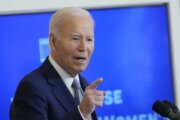Men aren’t the only ones who have made names for themselves as investors. One of the earliest American women to blaze a trail in finance was suffragette Victoria Woodhull. In 1870, she and her sister, Tennessee, became the first female stockbrokers and opened the first woman-owned Wall Street brokerage firm.
[Sign up for stock news with our Invested newsletter.]
Madam C.J. Walker created a vast business empire a few decades later by selling a line of homemade hair care products for Black women. At the time of her death in 1919, Walker was considered the wealthiest self-made Black businesswoman.
In 1967, Muriel Siebert became the first woman to own a seat on the New York Stock Exchange and founded her eponymous brokerage company, Muriel Siebert & Co.
The trend of successful women in business and finance continues to this day. Here are seven modern all-star women investors:
— Liz Ann Sonders
— Abigail Johnson
— Mellody Hobson
— Deborah A. Farrington
— Sonal Desai
— Suzanne Shank
— Cathie Wood
Liz Ann Sonders
Sonders “should be at the top of any list” of top women investors, says Courtney Huge, a certified financial planner at Wealth Enhancement Group.
As a managing director and chief investment strategist at Charles Schwab, Sonders covers the gamut from market and economic analysis to investor education. It’s her focus on the long term — both in perspective and career — that truly sets her apart, Huge says.
“Many strategists attempt to make short-term predictions about the market, whereas Sonders frequently reminds both retail and institutional investors that they cannot, and should not, time the market,” she says. Instead, Sonders tells investors to focus on creating a plan tailored to their goals and risk tolerance, and tune out the short-term market fluctuations.
Sonders entered the financial industry in 1986 as a managing director and senior portfolio manager at Avatar Associates. She moved to U.S. Trust in 1999, which was acquired by Schwab in 2000, and she’s been there since.
“Her permanence is becoming an increasingly rare characteristic on Wall Street,” Huge says.
Sonders many accolades includes being named to lists such as the SmartMoney magazine’s “Power 30,” US Banker’s “25 Most Powerful Women in Finance” and Barron’s “100 Most Influential Women in Finance” list every year since its inception.
Abigail Johnson
In 2016, Johnson took over as chairman of financial giant Fidelity Investments, which now oversees $13.7 trillion in total assets, after becoming CEO in 2014.
Robby Greengold, a strategist at Morningstar, says one of Johnson’s top decisions was to invest heavily in the firm’s passively managed side for the asset management business, expanding Fidelity’s exchange-traded fund, ETF, and index vehicles, among other products. Before that move, Fidelity was mostly known for stock-picking mutual funds, and Greengold says these assets have been a growth driver for Fidelity in recent years as investors’ interest shifts to passive investments.
“Despite it being a large organization, it has been nimble enough to keep up with the competition,” he says.
Johnson was named No. 2 on the “Most Powerful Women in Finance” list by American Banker in 2023.
Mellody Hobson
Hobson is co-CEO and president of Ariel Investments, a $15 billion investment manager. She oversees the management, strategic planning and growth for all areas of Ariel Investments, with the exception of research and portfolio management. Hobson also chairs the board of trustees of the Ariel Investment Trust, a part of the company that runs its publicly traded mutual funds.
Hobson sits on many corporate boards, including Starbucks (ticker: SBUX) and JPMorgan Chase & Co. (JPM), and she previously sat on the board for DreamWorks Animation and Estee Lauder Cos. (EL). She is known for her extensive research on minority investing patterns. Chenae Edwards, a partner with private investment advisory firm NEPC, says Hobson is committed to improving the diversity of the investment industry from the inside.
“Not only has she used her leadership role at Ariel Investments, but she has also leveraged her voice on corporate boards and her TED Talk to provide practical solutions for celebrating diversity and inclusion,” Edwards says.
[READ: 5 Apps for Socially Responsible Investing]
Deborah A. Farrington
Farrington is among the few women today running her own venture capital firm. She co-founded StarVest Partners in 1998. The company remains one of the largest women-owned VC firms in the U.S.
Raised by a father who worked for Lehman Brothers, Farrington grew up with an interest in finance that few women of her era had. She experienced the New York Stock Exchange trading floor firsthand at the tender age of 10 and told Harvard Business School, of which she is a graduate, it was “the most interesting thing” she’d ever seen.
Her name has appeared on the Forbes Midas 100 List of top venture capitalists multiple times, and even topped the list twice. She received the Foreign Policy Association Centennial Medal for Achievement in Financial Services in 2018.
Sonal Desai
Desai is the executive vice president and chief investment officer of Franklin Templeton Fixed Income, where she oversees several teams. She’s also a member of the firm’s executive committee, which is responsible for shaping its overall strategy, and serves as portfolio manager for several strategies from total return to fixed income.
She holds a Ph.D. in economics, the field in which her career began as a professor at the University of Pittsburgh. She then moved on to spend more than six years working for the International Monetary Fund in Washington, DC. before joining the private financial sector. She’s been with Franklin Templeton since 2009. Today, she oversees more than $200 billion at the firm.
Her name has appeared on Barron’s list of the “100 Most Influential Women in U.S. Finance” every year since it began in 2020.
Suzanne Shank
Shank co-founded investment banking firm Siebert Williams Shank & Co. LLC, in 1996. The firm has grown to be one of the most active underwriters of publicly traded equity, investment-grade corporate debt and municipal debt. It also holds the distinction of being a top-ranked minority- and women-owned investment banking firm in the U.S.
Shank’s path into finance was a bit more circuitous than others. She started working as an engineer in the electric boat division of General Dynamics before getting an MBA in finance and switching gears. She worked at several boutique firms on Wall Street before founding her own. She also serves on numerous boards, including the Kresge Foundation, Skillman Foundation and Global Citizen.
She’s earned many accolades, including being named one of USA Today’s Women of the Century in 2020 and featured in the Inc. 2024 Female Founders 250 list.
Cathie Wood
The ETF industry is known for having a higher-than-average number of women in financial roles, and one of the highest-profile participants is Cathie Wood, CEO and chief investment officer of ARK Investment Management. She founded ARK in 2014 as an actively managed ETF firm investing in disruptive innovations with long-term growth in mind. As CIO, she is the deciding vote on the firm’s investment decisions.
Todd Rosenbluth, senior director of ETF and mutual fund research at CFRA Research, says she and the firm stand out in a crowded ETF field. She got her start as an economist in Los Angeles before going on to manage more than $5 billion at AllianceBernstein and co-found an $800 million hedge fund.
Wood is very vocal and confident about the firm’s research, according to Rosenbluth, which has drawn some criticism. “But she has been able to demonstrate strong performance and let the performance and investment thesis speak for itself,” he says.
More from U.S. News
5 of the Best Undervalued Blue-Chip Stocks to Buy Now
9 Best Growth Stocks for the Next 10 Years
7 Top Women Investors originally appeared on usnews.com
Update 05/29/24: This story was previously published at an earlier date and has been updated with new information.







